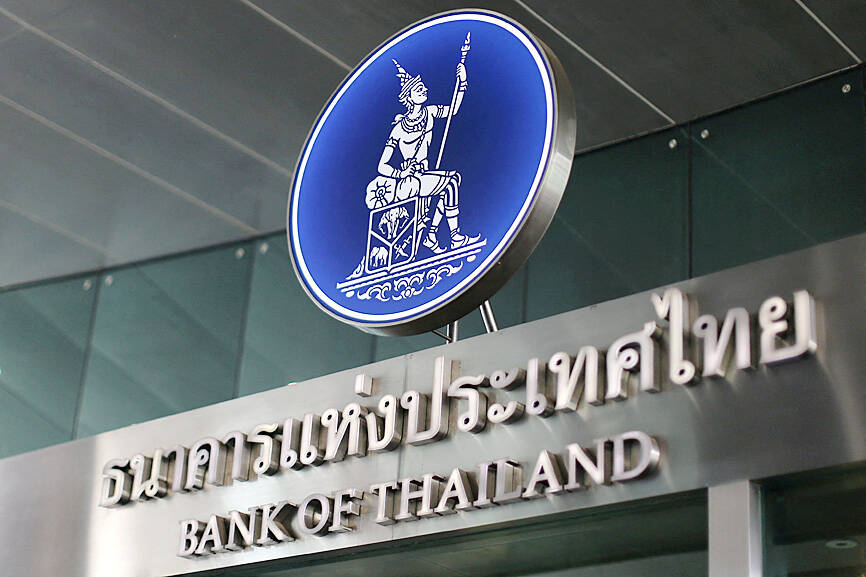The Bank of Thailand expects inflation to stay within the 1 percent to 3 percent target range in the next two years, Governor Sethaput Suthiwartnarueput said, describing the band as appropriate and supportive of the nation’s growth potential.
The inflation target, which has been kept for a fifth straight year, has “a proven track record of anchoring medium-term inflation expectations” and provides “sufficient flexibility towards accommodating inflation volatility from external and supply-side shocks,” the central bank chief said in a statement, days after the Cabinet approved the monetary policy target for next year.
Thailand’s inflation remained below the target for a sixth straight month last month at 0.95 percent, which has added pressure for the monetary authority to reduce borrowing costs. Even so, the Bank of Thailand on Wednesday last week left its key interest rate unchanged at 2.25 percent, following a surprise cut in October.

Photo: Reuters
“The MPC [Monetary Policy Committee] assessed that average headline inflation for 2025 and 2026 would remain within target range, although during some periods headline inflation might move temporarily outside of the target range due to economic shocks,” Sethaput said.
The Bank of Thailand and the Ministry of Finance have agreed to hold regular discussions to ensure coordinated fiscal and monetary policies, he said.
“In case of necessary or fitting circumstances, the Minister of Finance and the MPC may, by mutual agreement, revise the monetary policy target before proposing the new target to the Cabinet for approval,” he said.
Monetary policy would aim to foster sustainable growth and financial stability, and this involves appropriately setting the policy interest rates with support of other tools to help prevent excessive exchange rate volatility, he added.
There are no explicit commitments in the agreement to boost inflation to a midpoint target of 2 percent, as pushed by Thai Minister of Finance Pichai Chunhavajira.
If the average headline inflation in the past 12 months or the forecast for the next 12 months falls outside the target, the MPC would issue an open letter to the finance minister that would detail the reasons for the breach, the monetary policy actions undertaken in the past, as well as proposed steps for guiding inflation back on target, the statement said.

COMPETITION: AMD, Intel and Qualcomm are unveiling new laptop and desktop parts in Las Vegas, arguing their technologies provide the best performance for AI workloads Advanced Micro Devices Inc (AMD), the second-biggest maker of computer processors, said its chips are to be used by Dell Technologies Inc for the first time in PCs sold to businesses. The chipmaker unveiled new processors it says would make AMD-based PCs the best at running artificial intelligence (AI) software. Dell has decided to use the chips in some of its computers aimed at business customers, AMD executives said at CES in Las Vegas on Monday. Dell’s embrace of AMD for corporate PCs — it already uses the chipmaker for consumer devices — is another blow for Intel Corp as the company

ADVANCED: Previously, Taiwanese chip companies were restricted from building overseas fabs with technology less than two generations behind domestic factories Taiwan Semiconductor Manufacturing Co (TSMC, 台積電), a major chip supplier to Nvidia Corp, would no longer be restricted from investing in next-generation 2-nanometer chip production in the US, the Ministry of Economic Affairs said yesterday. However, the ministry added that the world’s biggest contract chipmaker would not be making any reckless decisions, given the weight of its up to US$30 billion investment. To safeguard Taiwan’s chip technology advantages, the government has barred local chipmakers from making chips using more advanced technologies at their overseas factories, in China particularly. Chipmakers were previously only allowed to produce chips using less advanced technologies, specifically

MediaTek Inc (聯發科) yesterday said it is teaming up with Nvidia Corp to develop a new chip for artificial intelligence (AI) supercomputers that uses architecture licensed from Arm Holdings PLC. The new product is targeting AI researchers, data scientists and students rather than the mass PC market, the company said. The announcement comes as MediaTek makes efforts to add AI capabilities to its Dimensity chips for smartphones and tablets, Genio family for the Internet of Things devices, Pentonic series of smart TVs, Kompanio line of Arm-based Chromebooks, along with the Dimensity auto platform for vehicles. MeidaTek, the world’s largest chip designer for smartphones

TECH PULL: Electronics heavyweights also attracted strong buying ahead of the CES, analysts said. Meanwhile, Asian markets were mixed amid Trump’s incoming presidency Taiwan Semiconductor Manufacturing Co (TSMC, 台積電) shares yesterday closed at a new high in the wake of a rally among tech stocks on Wall Street on Friday, moving the TAIEX sharply higher by more than 600 points. TSMC, the most heavily weighted stock in the TAIEX, rose 4.65 percent to close at a new high of NT$1,125, boosting its market value to NT$29.17 trillion (US$888 billion) and contributing about 400 points to the TAIEX’s rise. The TAIEX ended up 639.41 points, or 2.79 percent, at 23,547.71. Turnover totaled NT$406.478 billion, Taiwan Stock Exchange data showed. The surge in TSMC follows a positive performance